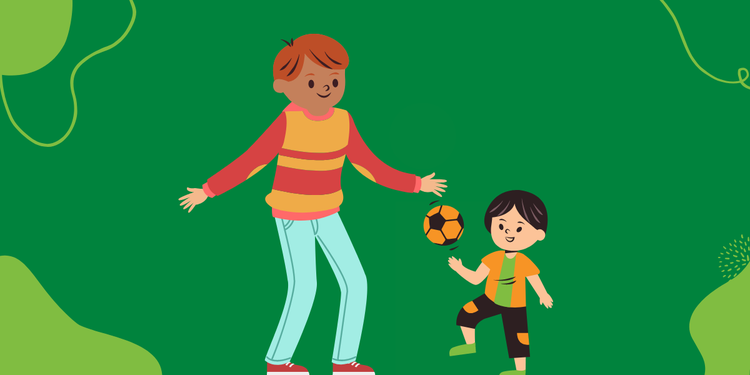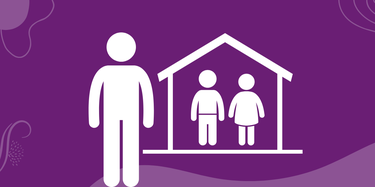CREATING STABILITY FOR CHILDREN
Creating stability for children to support their mental health and allow them to cope with stressful situations.
➤ Safety
➤ Care, Praise, and Appreciation
➤ Talking and Spending Time Together
➤ Play and Exercise
➤ Maintaining Routine
Safety
- Having a plan for safety and explaining your decisions and actions helps children feel safe.
- Try not to be separated for long periods of time, for their safety.
- Ensure your child knows their names, where you are staying, and how to get help if you become separated.
- If your children go to a new place with you, agree on a plan about somewhere safe that you will meet if you become separated.
- If it is safe for your child to go out to play, tell them to let you know where they are going and when they will be back.
- Parents should become familiar with their surroundings and accessibility of the place and then communicate with children (especially those with physical disabilities, such as children who are blind). Also parents should communicate accessibility needs with an authority and if needed, request to be relocated, e.g. to ensure access to WASH facilities, health points, or educational settings. For some children with cognitive disabilities, it is important to be in a quiet place. If needed, consider asking for devices such as headphones to help to create a quiet environment.

Care, Praise, and Appreciation
- Children cope better when they feel they can help others. It makes them feel needed and important.
- Show children that you care about them, such as by being affectionate, smiling at them, telling them that you love them, giving them hugs, or holding their hands.
- Praise your child for how they are coping and when they have done something good or helpful, however small it may seem.
- Sometimes children misbehave because they don't understand what their caregivers want them to do. Instead of just saying what you don't want them to do, try to give clear and specific instructions about what you do want them to do.
- Children learn by watching the adults around them. Demonstrating the behaviors you want to see from them is very important (such as speaking kindly, behaving in a calm and predictable way, sharing, tidying up).
- Try to use positive words rather than negative ones when giving instructions. For example, 'Don't put that there' is negative wording and can sound as if you are annoyed. 'Please put that here ... thank you for helping' makes it clear what you want them to do and expresses appreciation. It can take some time to get used to speaking in a calm, clear, and positive way. Be patient with yourself as you practice this way of communicating.

Talking and Spending Time Together
- Pay attention to each child. Spend a few moments giving them your full attention whenever you can, making eye contact. This will help them feel more confident and secure.
- Ask the child how they are feeling. Acknowledge how hard this time is for them. Take time to listen to them and try to understand what they have experienced.
- Do not force or pressure children into talking about distressing events. Try to talk about different things, not only the distressing situation.
- Acknowledge how the child is feeling, such as by saying, 'I can see that this is really hard for you,' 'it seems like you are feeling worried', or 'it sounds like you are feeling angry'.
- Do not tell your child what emotions they 'should' or 'should not' feel. Telling a child 'don't be sad', 'don't be angry' or 'don't cry' usually does not stop them from feeling this way and it may make them feel more alone and misunderstood. Help them to understand that it is normal to feel sad and cry.
- Model how to manage strong emotions. Help children see that adults also sometimes have strong feelings (like sadness, worry, anger, or grief) and they can manage these feelings by taking time to calm down, talking, and sharing the feelings with others.
- Sometimes children can feel like the bad things that have happened are their fault. If this happens, try to reassure them that the crisis is not because of anything they have said or done.
- Do not promise your children things you cannot provide. Instead, reassure them that there are many people around the world working hard to try to stop these bad things from continuing to happen.
- Try to give children honest information about what is happening, but keep it at a level that they can understand and cope with. Try not to overload children with things that you are worried about, such as financial worries, loss of property, or worry about other family members.
- Try to build set times into your daily routine for children to connect with friends and relatives.
- Try to stay hopeful and positive when speaking with your children. At the end of each day ask everyone to share: one thing they are grateful for and one thing that was fun about today.

Play and Exercise
- Encourage your child to play with you, their siblings or other children. Play is important in helping children learn, build concentration, and manage stress. It helps maintain some normality in their lives.
- Exercise helps improve mental or physical wellbeing. Ask your child for ideas on how you can exercise, even in small spaces, like jumping or running in circles.

Maintaining Routine
- Try to maintain everyday routines, such as bedtimes, as much as you can.
- Taking time to sit together, tell stories, draw, or sing songs at the same time every day (like in the morning or before bed) can help establish a predictable routine.
- Knowing what is going to happen can help children feel safer, give them a sense of control, and reduce feelings of uncertainty and confusion.

Explore the Bebbo app from UNICEF, it is your pocket partner in parenthood. Bebbo offers a wide range of parenting tips and other useful resources for parents and caregivers of children aged 0-6 years old. It’s available in multiple languages, including Ukrainian. It is free to use and you can download it on Google PlayStore / Apple AppStore.



